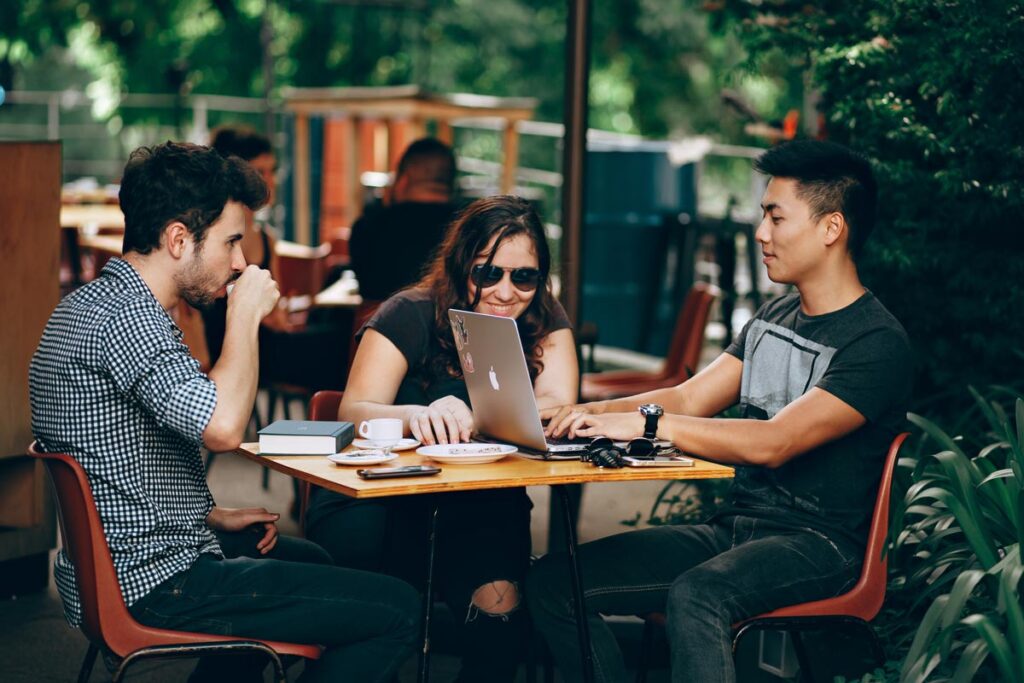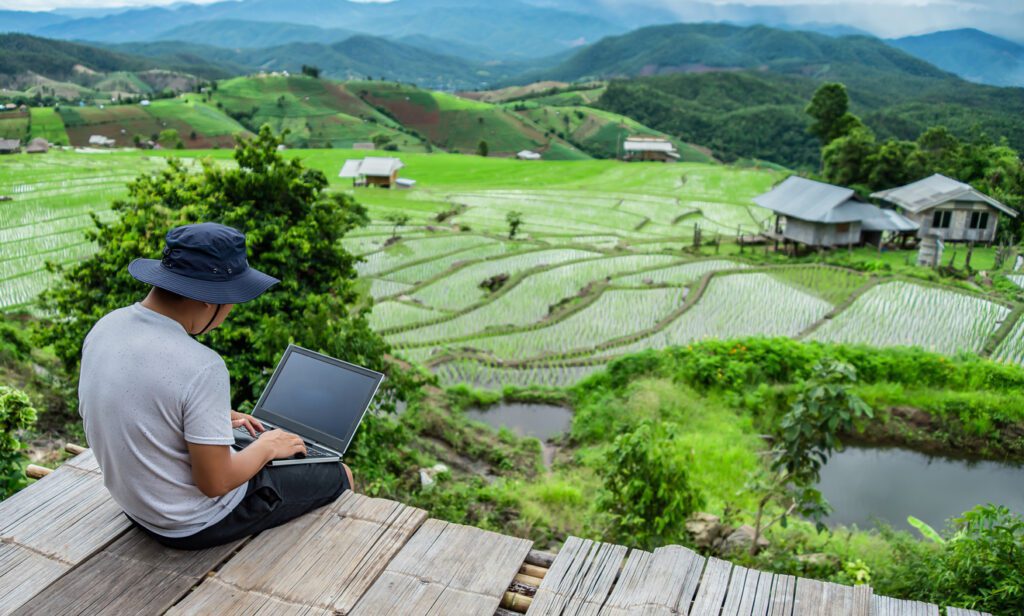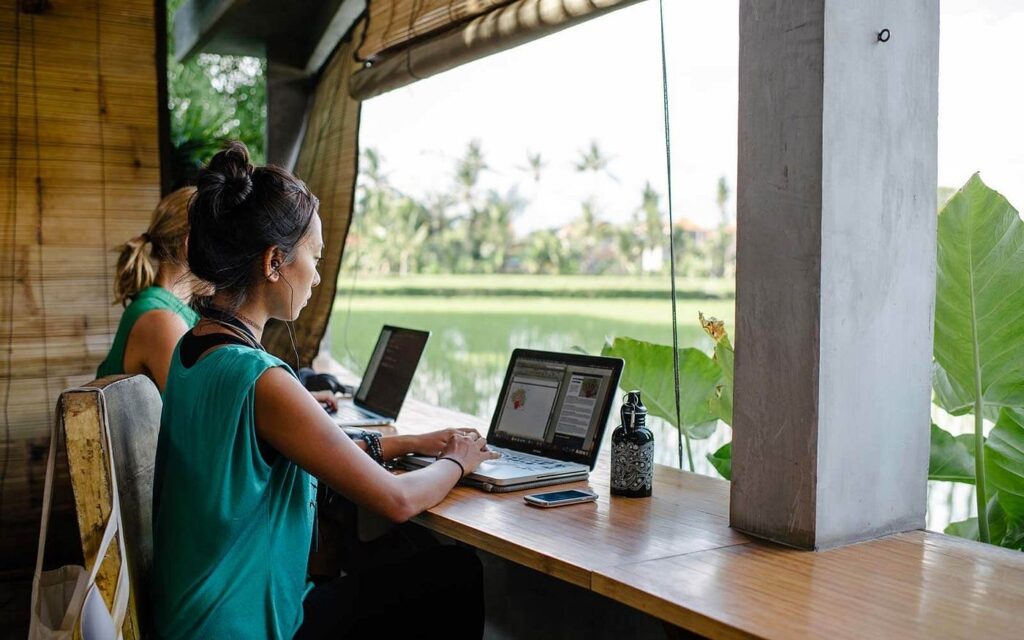Looking for a place that feels easy, friendly, and good for work? Thailand for digital nomads still hits the sweet spot in 2025. Costs stay low if you choose well, Wi‑Fi is strong in most cities, and the day-to-day rhythm is simple to love.
This guide shows the best bases, how the new Destination Thailand Visa works, where to get fast internet, sample budgets, and what to do after work. Quick city vibes: Bangkok brings big-city energy, Chiang Mai offers calm and community, Phuket gives you beach life and island time.
By the end, you can pick your city, know your visa path, and plan a budget that fits your work goals.

Best Places to Live in Thailand for Digital Nomads: Bangkok, Chiang Mai, Chiang Rai or Phuket?
Each city fits a different kind of nomad. The right base depends on your pace, your budget, and what fills your weekends.
- Bangkok suits builders and networkers who want energy, access, and nonstop options.
- Chiang Mai fits long stays, tight budgets, and a focused, social routine.
- Phuket works if you want the beach near your laptop and easy weekend trips.
Timing matters. High season runs from November to February with the best weather and bigger crowds. Rainy months are May to October, which can lower prices, especially in Phuket. In Chiang Mai, smoke season hits in late winter, which affects air quality.
Bangkok: Big-city energy, world-class food, and endless coworking
Bangkok rewards ambition. Internet is fast, most apartments have fiber, and the BTS and MRT keep you moving. You get a huge cafe scene, many coworking options, and a global network on your doorstep.
- Coworking to trust: The Hive Sathorn, WeWork at Exchange Tower, Hubba Thailand.
- Best BTS or MRT areas: Thonglor, Ekkamai, Phrom Phong, Ari, Silom-Sathorn.
- Budget range: about $900 to $1,800 per month, based on lifestyle.
- What you gain: international flights, top hospitals, serious gyms, and nightlife that runs late.
- Tradeoffs: more noise and traffic, slightly higher prices, and longer commutes if you are far from transit.
Bangkok is a great base if your workday needs strong infrastructure and your nights need variety. Think of it like a coworking campus that happens to be a city.
Chiang Mai: Calm, community, and great value for long stays
Chiang Mai is the classic deep-work hub. It is slower, cheaper, and built for a long, balanced routine. You get mountains on your doorstep and a nomad community that is easy to join.
- Coworking to try: CAMP Chiang Mai, Mana Coworking Space, Punspace Nimman.
- Best areas: Nimmanhaemin for cafes and coworking, Old City for culture and walkability.
- Budget range: about $600 to $1,300 per month.
- Perks: nearby hikes, waterfalls, and temples to reset on weekends.
- Timing tip: smoke season can hit air quality from late January to April. Use an air filter at home or plan a trip during that stretch.
If you want to code, write, or design without distraction, Chiang Mai gives you space to breathe and focus.
Phuket: Work by the beach with island adventures on tap
Phuket is for people who want the ocean in their daily routine. Work in the morning, swim at lunch, then plan a boat day for Saturday. It is pricier near the beach, but the trade feels worth it if water is your happy place.
- Coworking picks: Workation Phuket, The Office Phuket.
- Best areas: Phuket Town for culture and lower prices, Chalong for fitness and muay thai, Kata and Kamala for beach life.
- Budget range: about $800 to $1,600 per month, higher in tourist hotspots.
- Perks: easy access to diving, snorkeling, and island hopping.
- Season tip: seas are calm from November to April, surf picks up in the rainy season. Book tours midweek to avoid crowds.
Choose Phuket if your work thrives when your breaks look like postcards.
Chiang Rai for Digital Nomads?
Chiang Rai, the northernmost city in Thailand, is emerging as a serene alternative to the bustling digital nomad hub of Chiang Mai. With a population of around 70,000, it’s compact, less touristy, and ideal for those seeking productivity amid natural beauty—think misty mountains, serene temples, and hill tribe villages—without the distractions of nightlife or crowds.
It’s especially appealing for introverts or families wanting a slower pace, and recent reports rank it as the second-safest city globally for female digital nomads, thanks to low crime rates, friendly locals, and strong protections against harassment (93% of women feel safe walking alone at night). However, it’s not for everyone: expect fewer events and amenities compared to bigger spots.
| Category | Monthly Cost (USD) | Notes |
|---|---|---|
| Rent (Studio/Apartment) | $300–500 | Central Chiang Rai condos with pool/gym; Mae Fah Luang area for quieter vibes. Use Facebook groups or Booking.com for long-term deals. |
| Food | $200–300 | Street eats and khao soi (coconut curry noodles) for $2–3/meal; vegan options limited but growing. |
| Transport | $50–100 | Songthaews (shared trucks) $0.50/ride; Grab rides $2–5; rent a scooter for $100/month. |
| Coworking/Internet | $50–100 | Fast Wi-Fi (25–450 Mbps) standard; eSIMs like ESIM THAILAND for reliable mobile data. |
| Misc (Gym, Entertainment) | $100–200 | Temples are free; day trips to White Temple ~$10. |
Other nomad-friendly spots worth a look
- Koh Phangan: best for yoga, wellness, and a tight remote work scene. Fly to Koh Samui, then take a short ferry.
- Koh Lanta: quiet beaches and a relaxed pace. Reach it via Krabi Airport, then shuttle and ferry.
- Krabi: dramatic cliffs and nature. Stay in Ao Nang for easy boats to islands.
- Pai: cool weather and a creative crowd. Drive or take a minivan from Chiang Mai, roads are winding so plan your timing.
How to Work From Thailand in 2025: Visas, Wi‑Fi, Coworking, and Costs
You only need four things to settle in fast: the right visa, a data plan, a solid workspace, and a clear budget.
Visa options made simple: Destination Thailand Visa (DTV) and more
The Destination Thailand Visa is built for remote workers who earn from abroad.
- Validity: 5 years, multiple entries allowed.
- Stay per entry: 180 days, with one extension for another 180 days per visit.
- Where to apply: from outside Thailand, through a Royal Thai Embassy or the official e‑visa portal.
- Typical fee: varies by embassy, often in the low thousands of THB.
- You must be 20 or older.
- Show funds: at least 500,000 THB in a bank account for the prior months, as requested in the application.
- Work rules: you cannot work for Thai companies or get a Thai work permit. Your income must come from abroad.
- Proof: show employment or client contracts, bank statements, and supporting documents.
Short stays: many passports get visa-exempt entry on arrival for 30 days, which you can extend once at immigration. Tourist visas cover longer trips for most nationalities. Check your embassy page for current rules.
DTV checklist:
- Passport with at least six months validity
- Digital passport photo
- Proof of remote work or business activity
- Bank statements showing required funds
- Proof of income or invoices
- Travel plan and accommodation details
- Copies of everything saved to cloud and phone
Keep digital and paper copies. It saves headaches if asked for proof.
Reliable Wi‑Fi, SIM cards, and coworking spaces you can trust
Mobile data is cheap, and home internet is fast in major cities.
- Buy a SIM at the airport or a mall from AIS, True, or dtac. Get an unlimited plan for hotspot use.
- Average speeds:
- Bangkok: 150 to 250 Mbps, very stable
- Chiang Mai: 80 to 150 Mbps
- Phuket: 100 to 180 Mbps, better near main towns
Coworking you can count on:
- Bangkok: The Hive, WeWork, Hubba
- Chiang Mai: CAMP, Mana, Punspace
- Phuket: Workation Phuket, The Office
Practical tips:
- Bring a small power strip for cafes with tight seating.
- Use a laptop lock in busy spaces.
- Book call rooms for client meetings.
- Test backup power and fiber at your coworking if your job needs uptime.
Cost of living in Thailand for digital nomads: sample monthly budgets
Below are realistic ranges if you live in city hubs and work full time. Your costs can drop if you cook more or avoid peak tourist zones.
| City | Budget Range (USD) | Rent & Utilities | Coworking | Food & Coffee | Transport & Grab | Gym | Data/Internet | Weekend Fun | Notes |
|---|---|---|---|---|---|---|---|---|---|
| Bangkok | $900 to $1,800 | $450 to $900 | $80 to $160 | $250 to $400 | $40 to $90 | $30 to $60 | $15 to $30 | $60 to $150 | Live near BTS or MRT to save time |
| Chiang Mai | $600 to $1,300 | $250 to $550 | $60 to $120 | $200 to $320 | $20 to $40 | $25 to $50 | $12 to $25 | $40 to $120 | Scooter or walkable areas keep costs low |
| Phuket | $800 to $1,600 | $350 to $750 | $70 to $150 | $220 to $380 | $50 to $120 | $30 to $60 | $15 to $30 | $60 to $140 | Prices rise near the beach and in high season |
Simple savings tips:
- Bangkok: pick a condo within a 10-minute walk of transit, then skip most taxis.
- Chiang Mai: cook simple meals and use local markets for fresh produce.
- Phuket: live in Phuket Town or Chalong, then bus or ride to the beach.
Find housing fast: areas, leases, and scams to avoid
You can land, work, and find a home in a week if you plan it well.
Step-by-step plan:
- Book a hotel or serviced apartment for 7 to 14 nights in a central area.
- Tour 5 to 8 apartments in person, Wi‑Fi test each unit with a speed app.
- Compare weekly and monthly rates. Longer stays usually get a better deal.
- Negotiate. A small discount for 3 to 6 months is normal.
- Read the contract line by line. Get every promise written.
Where to search:
- Facebook groups for each city and neighborhood
- Local agents who focus on expats
- Walk into condo buildings and ask the juristic office about available units
What to expect:
- Deposits are often 1 to 2 months of rent, plus first month upfront.
- Utilities vary with AC use. Electric bills can spike in hot season.
- Check water pressure, street noise at night, and cell signal inside.
Red flags:
- Large cash asks without a contract
- Requests to hold your passport
- Pressure to pay on the spot before you see the unit
- Utility “flat fees” that seem far above normal

Play Time: Food, Culture, Beaches, and Weekend Trips
Your free time can be rich without draining your budget. Street food is a daily treat, temples are low cost, and outdoor trips can be simple to plan.
Bangkok highlights: temples, markets, and rooftop sunsets
Try this balanced day off:
- Morning: visit the Grand Palace or Wat Pho right when they open.
- Lunch: eat pad kra pao or som tam at a local street market.
- Afternoon: take a Chao Phraya river boat and stop at a market by the pier.
- Sunset: grab a drink at a rooftop near Sukhumvit or Silom.
- Night: walk a market like Talad Rot Fai or Jodd Fairs for snacks and gifts.
Move around with BTS and MRT to bypass traffic. Use Grab when carrying gear or after midnight. For weekend fun, book a Thai cooking class or a muay thai intro class to learn the basics.
Chiang Mai favorites: mountains, night bazaars, and festivals
Weekend ideas that mix nature and culture:
- Hike at Doi Suthep for views or Doi Inthanon for cooler air.
- Visit ethical elephant sanctuaries that avoid riding and use small groups.
- Shop at the Saturday Night Market or the Sunday Walking Street for crafts.
- Take a coffee farm tour in the hills, then get a foot massage after work.
Peak season runs from November to February with cool mornings and clear skies. Watch for Loi Krathong and Yi Peng lantern festivals, both are beautiful and busy. Book rooms early for friends who visit.
Phuket and beyond: beaches, diving, and island hopping
You can fill months with blue water and island trips:
- Day trips: Phi Phi for beaches, Phang Nga Bay for limestone cliffs, Similan Islands for diving.
- Beach picks by vibe: Kata for surfing, Kamala for calm water, Nai Harn for sunsets.
Book island tours on weekdays to avoid the biggest crowds. Check marine forecasts before booking a boat. Pack reef-safe sunscreen, a hat, and more water than you think you need.
Safety and etiquette: stay smart and respectful
Thailand feels friendly and safe, yet common sense still wins the day.
- Watch your bag in busy markets and on boats.
- Use official taxis, metro, or ride apps like Grab.
- Avoid poorly lit areas late at night.
- Carry copies of your passport and visa in your bag. Keep originals in a safe place.
- Dress modestly at temples, cover shoulders and knees, and remove shoes when asked.
- Learn a few phrases, like sawasdee krub/ka for hello and khop khun krub/ka for thank you. A smile goes far.
- Keep travel insurance current, including medical and device cover.
Quick City Comparison
This table helps you match your work style to a city.
| City | Best For | Top Areas | Internet Speed | Core Pros | Core Cons |
|---|---|---|---|---|---|
| Bangkok | Builders, networkers, frequent flyers | Thonglor, Ekkamai, Ari, Silom-Sathorn | 150 to 250 Mbps | Flights, hospitals, gyms, food variety | Traffic, noise, higher rents |
| Chiang Mai | Focused long stays, tight budgets | Nimman, Old City, Santitham | 80 to 150 Mbps | Value, community, nature access | Smoke season, smaller nightlife |
| Phuket | Beach lovers, divers, social days | Phuket Town, Chalong, Kata, Kamala | 100 to 180 Mbps | Beaches, islands, fitness hubs | Tourist prices, seasonal crowds |
Final Tips to Start Strong
Make your first month simple. Land, test, then commit longer once it clicks.
Action checklist:
- Choose your base city that matches your work style.
- Set a monthly budget that fits your savings goals.
- Prepare your DTV documents and keep copies ready.
- Buy a flexible flight and arrive with buffer days.
- Book a week in a central area near transit or the beach.
- Tour 5 to 8 apartments, speed test inside each unit.
- Pick a coworking space with quiet call rooms.
- Plan your first weekend trip to settle in and recharge.
Start small, learn the rhythm, then extend if it fits your routine. Thailand rewards people who balance work and play, and 2025 looks set to be a great year to do both.
















